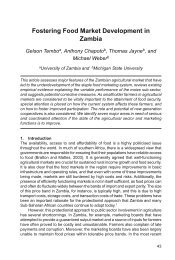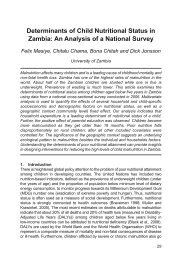Introduction to Basic Legal Citation - access-to-law home
Introduction to Basic Legal Citation - access-to-law home
Introduction to Basic Legal Citation - access-to-law home
Create successful ePaper yourself
Turn your PDF publications into a flip-book with our unique Google optimized e-Paper software.
§ 6-560. Short Form <strong>Citation</strong>s - Journal Articles<br />
Full <strong>Citation</strong><br />
Stephen J. Legatzke, Note, The Equitable Recoupment Doctrine in United States v. Dalm:<br />
Where's the Equity, 10 Va. Tax Rev. 861 (1991).<br />
Short Form <strong>Citation</strong>s<br />
Id.<br />
Id. at 862.<br />
Legatzke, supra.<br />
Legatzke, supra at 862.<br />
Use id. if the authority is the same as the immediately preceding authority. Use supra if not<br />
referring <strong>to</strong> the immediately preceding authority.<br />
§ 6-600. Context Examples<br />
Contents | Index | Help | < | ><br />
Adapted from Respondent's Brief, Int'l Soc'y for Krishna Consciousness, Inc. v. Lee,<br />
505 U.S. 672 (1992).<br />
Since the 1974 decision in Lehman v. City of Shaker Heights, 418 U.S. 298 (1974), this Court<br />
has relied upon public forum analysis <strong>to</strong> decide cases in which persons have sought <strong>to</strong> use<br />
government property for expressive activity in violation of rules which restrict or prohibit<br />
such activity. See United States v. Kokinda, 497 U.S. 720, 725 (1990).<br />
This Court has held that a site owned by the government is a traditional public forum only if it<br />
is among "those places which 'by long tradition or by government fiat have been devoted <strong>to</strong><br />
assembly and debate."' Cornelius, 473 U.S. at 802, quoting, Perry Educ. Ass'n, 460 U.S. at 45.<br />
This description hearkens back <strong>to</strong> the often-quoted passage from Hague v. CIO, 307 U.S. 496<br />
(1939):<br />
Wherever the title of streets and parks may rest, they have immemorially been held in trust<br />
for the use of the public and, time out of mind, have been used for purposes of assembly,<br />
communicating thoughts between citizens, and discussing public questions. Such use of the<br />
streets and public places has, from ancient times, been a part of the privileges, immunities,<br />
rights, and liberties of citizens.<br />
Id. at 515.<br />
The Port Authority airports' sole purpose of facilitating air travel is reflected in all of their<br />
characteristics - planning, operation, design, usage, financing, lack of integration with<br />
142




